Перед названиями рек употребляется определенный артикль: the Thames [temz] Темза (the River Thames река Темза), the Volga ['volga ] Волга (the Volga River река Волга), the Don [don] Дон, the Hudson ['hAdsn] Гудзон.
TEXT
Learn these words and word combinations
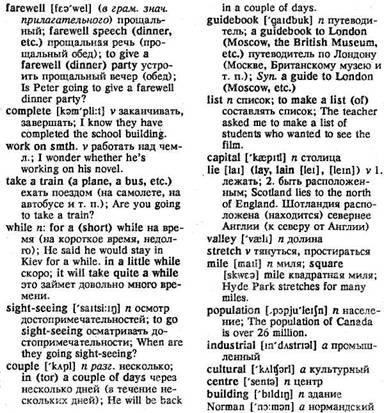
Exercise 1. Read and translate these sentences. Pay attention to active words and word combinations.
1. How did you like his farewell speech? 2. Michael said he would stay there for a short while. 3. I know they are returning in a couple of days. 4. The British Isles lie to the west of Europe. 5. May I use your textbook, please? 6. There were quite a few interesting books on display. 7. Amundsen reached the South Pole in 1911. 8. He said they would travel by day and stay at hotels every night. 9. The guide told them about the historical events that had taken place many years before. 10. He told me he had seen some of the sights at night. 11. Nearly a hundred new houses were built in the old part of the city recently. 12. The skyscraper made of glass and steel looked beautiful. 13. "Has anything changed since you last saw the town?" she asked him. 14. "Is Mr Brown still engaged?" "Yes, I think so." 15. There was a striking contrast between the two sisters.
A VISIT TO LONDON
On September 25, 1984 Peter Fedorov, a lecturer at Moscow University, was giving a farewell dinner party to his friends as he was leaving for Great Britain the next day. Peter told his friends that he would teach spoken £ussian to English students at Leads University for a year. He also said he would try to complete the English textbook he was working on.
His friends asked Peter whether he was going by air or by train. Peter said that he was going by air. George Lunin, one of his colleagues, who had been to England before, advised him to take the train. George said if Peter went by train he would be able to see Poland, Germany and the Netherlands on his way to England. George said it had taken him about two days to get to London.
Peter's friends asked him whether he would be able to stay in London for a while and go sight-seeing. Peter hoped he would stay in London for a couple of days. He said he had already read the guidebook to London and had made a list of places he wanted to see.
This is what Peter read about London.
London, the capital of Great Britain, lies in the valley of the Thames. "Greater London"1 stretches for over thirty miles from north to south2 and for over thirty miles from east to west. Its population is about seven million. London is the biggest industrial and cultural centre of Great Britain.
One of the oldest buildings in London is the Tower. William the Conqueror,3 the first Norman king, built it in the eleventh century. For hundreds of years the Tower was used as a fortress, a residence of kings and a prison. The most popular sight in the Tower nowadays is the Jewel House in which the Crown jewels4 are on display.
St Paul's Cathedral is not very far from the Tower. The cathedral the most striking building in the City,5 was designed by Sir Christopher Wren, an outstanding British architect.
The City of London is a very small part of the whole, it is only one square mile in area but it is the most important banking and commercial centre of the country. Every day over a million white-collar workers come to the City offices and banks.
If you walk westwards from St Paul's you reach Fleet Street. Here the most important newspapers and news-agencies have their offices.
Walking along the Strand you can reach the Houses of Parliament. The new building for the Houses of Parliament was built in 1840 on the site of the old Palace of Westminster. When Parliament sits a flag flies from the Victoria Tower by day and a light in the Clock Tower above the famous Big Ben6 burns by night.
Opposite the Houses of Parliament stands Westminster Abbey, famous for its architecture and historical associations. Nearly all kings and queens have been crowned7 in the Abbey since the time of the Conquest.8 Chaucer, Spencer Tennyson, Dickens and many other famous men and writers were buried there. In the Poet's Corner9 there are memorials to Shakespeare, Milton, Burns, Byron and many other poets and writers.
One of London's attractions is its parks, Hyde Park the most famous of them.
There are many other historical buildings and museums in London. Some skyscrapers made of glass and steel10 were built in London recently but they are not popular with English people who traditionally like to live in small two-storey houses.
Names
Leeds [li:dz] г. Лидс
Poland ['poubnd ] Польша
Germany [4зэ:тэш ] Германия
the Netherlands ['nedabndz] Нидерланды
the Jewel ['d3u:sl] House Хранилище сокровищ
St Paul's Cathedral [seint 'pxlz ka'8i:drl] собор св. Павла
Sir Christopher Wren ['kristsfe 'ren] Кристофер Рен
Fleet Street Флит-Стрит
the Strand [strand] Странд (улица)
the Palace ['paelis] of Westminster ['westmmsta ] Вестминстерский дворец (здание английского парламента)
Westminster Abbey ['азЫ ] Вестминстерское аббатство
Chaucer ['ф:зэ] Чосер
Spencer ['spensa] Спенсер
Tennyson l'tenisn] Тенкисон
Shakespeare ['jekspia] Шекспир
Milton ['miltn] Мильтон
Notes
1. Greater London Большой Лондон (состоит из Лондона и частей графств Мидлсекс, Эссекс, Кент, Суррей, Хартфордшир; делится на 32 района)
2. from north to south. В сочетании с предлогами from... to артикль, как правило, не употребляется.
3. William the Conqueror ['wiljam бэ 'кэдкэгэ] Вильгельм Завоеватель, Вилгельм I (1027 — 1087), первый король из норманнов в Англии
4. the Crown [kraun] jewels сокровища короны (королевские драгоценности)
5. The City Сити (исторический центр Лондона, один 1из крупнейших коммерческих центров; в нем находятся |главные банки)
6. Big Ben "Биг Бен", "Большой Бен" (колокол часов-|курантов на здании парламента, бой которых передается I ежедневно по радио как сигнал точного времени)
7. have been crowned (форма Perfect а страдательном I залоге) были коронованы
8. the Conquest ['kogkwest] завоевание (Англии нор-(маннами под предводительством Вильгельма Завоевателя в 11066 г.)
9. the Poet's ['po(u)its] Corner Уголок поэтов (часть (Вестминстерского аббатства, где похоронены известные поэты и писатели)
10. made of glass [gla:s] and steel сделанные из стекла и стали (made — причастие прошедшего времени употребленное в функции причастного определительного оборота).
Exercise 2. Read and translate the text.
Exercise 3. Find in the text English equivalents for these word combinations and sentences.
1. Петр сказал своим друзьям, что он будет обучать английских студентов разговорному русскому языку. 2. Он сказал, что поедет поездом. 3. Георгий сказал, что, если Петр поедет поездом, он сможет увидеть Польшу и другие страны. 4. Друзья спросили его, сможет ли он остановиться |в Лондоне. 5. Он сказал, что он уже прочитал путезоди-[тель по Лондону. 6. раскинулся более чем на тридцать [миль с севера на юг. 7. Тауэр использовался как крепость. 18. очень небольшая часть от целого. 9. Вы дойдете до Флит-Стрит. 10. было построено в 1840 году. 11. который [славится своей архитектурой и историческими ассоциациями.
Exercise 4. Quote the sentences in which these words and word combinations are used in the text.
farewell, while, sightseeing, couple, list, to lie, mile, I building, to build, hundreds of, to be used, striking, whole, in area, nearly, recently, district
Exercise 5. Study the text and answer these questions.
1. Why was Peter Fedorov giving a farewell party to his friends? 2. What did Peter tell his friends about his job*? 3. Why did George Lunin advise Peter to go to London by train? 4. What did Peter's friends ask him about? 5. For how long did Peter hope to stay in London? 6. Where is London situated? 7. What is the oldest building in London? 8. Who was St Paul's Cathedral designed by? 9. What is the city famous for? 10. What do you know about Fleet Street? 11. When was the new building for the Houses of Parliament built? 12. What is Westminster Abbey famous for?
* job работа
Exercise 6. Insert prepositions or adverbs.
1. Lenin visited London several times. In 1902 he came... London to prepare everything... the publication*... "Iskra". He stayed... London... a short while.... his stay he studied the life... the British workers and attended their meetings. He liked to walk... London streets. He knew London very well and called it a city... great contrasts. 2. Karl Marx came... England... the summer... 1849... the age... thirty-one, and spent there the rest of his days.** Marx was buried... Highgate Cemetery.*** 3. Glasgow, one... Britain's industrial centres, is famous... its historical associations.... Daniel Defoe ['daenisl 'di:fou] said that Glasgow was "one... the cleanliest, most beautiful and best-built cities in Great Britain". Modern Glasgow is a very large city that stretches... many miles... north... south and... east... west. 4. The teacher asked Ann to make a list... students who wanted to go... the Television Tower. 5. John's sister bought a guidebook... Kiev yesterday. 6. George is going to give a farewell dinner... his friends as he is leaving... Siberia... a couple of days. 7. How many cars are there... display? 8. How many memorials... Pushkin are there in Moscow? Exercise 7. Insert articles where necessary.
* publication [,pAbh'keiJn3 публикация
** the rest of his days всю оставшуюся жизнь
*** Highgate Cemetery ['haigit 'semstri] Хайгетское кладбище
1. Londoners are fond of... beautiful parks of their city. At weekends hundreds of people come to... parks. 2. Most of... London streets are narrow.... Oxford Street is... busiest street: there are... lot of department stores, shops and offices there. 3. St.Petersburg is one of... most beautiful cities in... world. 4. Tallinn is... ancient city... old part of... city with its narrow streets and two-storey buildings is like an open-air museum. Estonia [estoums] is famous for its festivals of... song. Festivals of... song take place all over.. the country in spring and in summer.
Exercise 8. Make up fifteen questions based on the text and answer them.
Exercise 9. Give a summary of the text "A Visit to London".
Exercise 10. Open the brackets and put the verbs in the proper tenses.
1. John told me he (to give) a farewell dinner party the following Friday. 2. She said Jane Morton (to teach) spoken English at Moscow University then. 3. Mr Chandlers said that Kiev (to change) greatly for the last ten years. "It (to be) one of the most beautiful cities in the Ukraine", he added. 4. He said that Mr Barton (to stay) in Tallinn for a couple of weeks. 5. The guide said that the sightseeing tour (may) take them from four to six hours. 6. I wondered whether the train (to reach) already Leeds. 7. The teacher told Mrs Jones that there (to be) a striking contrast between her two children. 8 He said that they <to visit) the Tower the day before. 9. The guide said that nearly all English kings and queens (to be crowned) in Westminster Abbey. 10. Jane asked her friend to make a list of things they (to need) for the trip. 11. The bus driver said that Suzdal (to be) only a few miles away. 12. I wondered whether he (to buy) a guide-book to St. Petersburg. 13. He said they (to walk) along Arbat when he {to meet) them. 14. Did he say that he (to stay) there for a short while? 15. She said she (to complete) the textbook she (to work on) the following month.
Exercise 11. Make up ten sentences using reported speech and the following active words.
to reach, to design, to go sightseeing, nearly, change, district, a couple of, to make a list of, to build, commercial
Exercise 12. Translate into English.
1. Москва — крупнейший промышленный и культурный центр страны. Москва славится своими театрами, парками и спортивными сооружениями (sports facilities [fs'silitiz]). В 1980 г. в Москве состоялись XXII Олимпийские игры. Спортсмены и туристы (tourist ['tusrist]) получили большое удовольствие не только от спортивных соревнований, но и от театральных спектаклей и концертов, которые состоялись во время Олимпиады. 2. Вашингтон, столица США, расположен на реке Потомак (the Potomac [po'toumak]) River). Вашингтон — политический центр страны. Вашингтон не очень большой город, его население менее 1 млн. человек. Большая часть населения Вашингтона — негры. 3. Петр сказал, что он пригласил на прощальный обед своих друзей и коллег. 4. Г-н Бертон (Burton) сказал мне, что он пробудет в Москве недолго. Он надеялся, что сможет посетить наиболее важные исторические памятники, музеи и выставки. 5. Анна сказала, что они уже добрались до аэропорта и не опоздают на свой рейс. 6. Гид сказал нам, что известный русский архитектор Растрелли (Rastrelli) спроектировал несколько великолепных дворцов в Санкт Петербурге. 7. Джордж сказал, что Москва очень изменилась с тех пор, как он ее видел в 1970 г.
Exercise 13. a) Prepare a talk* on these topics, b). Write an essay** on one of the topics.
* prepare a talk подготовьте выступление
** essay ['esei] эссе, сочинение
1. The town (the city) I like best. 2. A capital city. 3. Impressions of a visit to a town (a city).
LESSON TWO
Conversations: A. Asking the Way. B. On a Bus. C. Taking a Taxi. D. Telephone Conversation.
Learn these speech patterns
1. You' d (You had) better ask the policeman. Лучше спросите полицейского. (Лучше бы вы спросили полицейского.)
Exercise I. Make up sentences using the table and translate them.
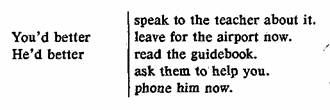
Exercise 2. Make the necessary substitutions and reproduce the dialogues.
A: I don't understand what he meant by that.
B: You'd better ask him.
(B: speak to him; tell him what you want to do; tell him everything).
2. Is this the right bus for the Town Hall? Этот автобус идет к ратуше? (Доеду ли я на этом автобусе до ратуши?)
Exercise 3. Make up sentences using the table and translate them.
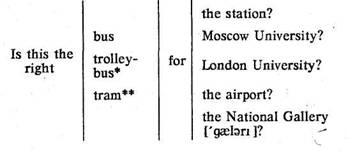
Exercise 4. Make up sentences using the pattern "Is this the right bus {tram, etc.) for..?"
Learn these Words and word combinations
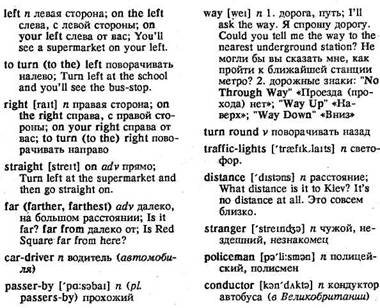
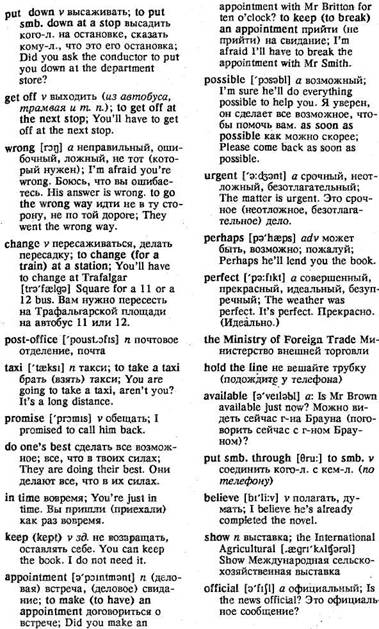
A. Asking the Way
1
A: Excuse me. Can you tell me where South Street is, please?
B: Take the second1 on the left and go straight on.
A: Is it far?
B: No, it's only about five minutes walk.
A: Thank you.
B: Not at all.
2
A (car-driver to a passer-by): Excuse me, please. Could you tell me the way to the station?
B: Turn round and turn left at the traffic-lights.
A Will it take me long?
B: No, it's no distance at all.
A: Thank you.
B: That's OK.
3
A: Excuse me, can you tell me where the nearest underground station is?
B: I'm a stranger here. You'd better ask the policeman.
A (to the policeman): Excuse me, officer,2 could you tell me the way to the nearest underground station?
B: You're going the wrong way. Go straight en and take the second on the right. You'll see it on your left.
B. On a Bus.
1
A (at the bus-stop): Is there a bus from here to the National Gallery3?
B: Yes, take a 124 and ask the conductor to put you down at Trafalgar Square.
A: Thank you.
B: That's OK.
2
A: Does this bus go to the station?
B: No, you'll have to get off at the bank and take a 12.
A: Can you tell me where to get off?
B: It's the next stop but one.5
3
A Is this the right bus for the Town Hall?
B: No, you're going the wrong way. You'll have to change at the post-office and take a 192.
A Thank you.
B: Not at all.
C. Taking a Taxi
A: Piccadilly,6 please. I have to be there by 10.30.
Taxi-driver: I can't promise, but I'll do my best... You're just in time. 70 p,7 please.
A: Thanks a lot. Here's 80 p. You can keep the change. (Here's a pound. Give me 20 p change, please.)
D. Telephone Conversation
1
Secretary: Good morning. Mr Browning's office.
Victorov: Good morning. Can I speak to Mr Browning, please? This is Victorov speaking.
Secretary: Mr Browning is out. Can I help you, Mr Victorov?
Victorov: I'd like to have an appointment with Mr Browning.
Secretary: When would you like to come?
Victorov: As soon as possible.
Secretary: I'm afraid there's nothing tomorrow. MrBrowning is very busy just now. If it is urgent, perhaps we could find time tomorrow.
Victorov: No, it isn't as urgent as that. It can wait until the day after fomorrow.
Secretary: What time could you come on Wednesday?
Victorov: As late as possible in the afternoon.
Secretary: Would 4.30 be all right?
Victorov: Yes, that's perfect. Thank you. Goodbye.
Secretary: Goodbye, Mr Victorov.
2
Secretary: Good morning. British Embassy.
Petrov: Good morning. I'd like to speak to Mr Weston, please.
Secretary: Who's calling, please?
Petrov: This is George Petrov from the Russian Ministry of Foreign Trade.
Secretary: Will you hold the line, please? I'll see if Mr Weston is available... I'm putting you through.
Mr Weston: Hello, Mr Petrov.
Petrov: Hello. I believe you know that the International Agricultural Show is to open next Wednesday, September 8th in Sokolniki Park. I wonder whether you would like to attend the official opening.
Mr Weston: Thank you very much for the invitation. Unfortunately I can't accept it. I have another engagement. I think Mr Morton will be able to attend the opening if you don't mind.
Petrov: We'll be glad to see Mr Morton. We're sending a Complimentary Ticket for him. Goodbye.
Mr Weston: Goodbye.
Notes
1. -Take the second {разг. сокр. от the second turning второй «оборот). Поверните на вторую улицу.
2. Excuse me, officer ['ofisa]. В Англии принято обращаться к полицейскому, употребляя слово officer (офицер).
3. the National Gallery Национальная галерея (крупнейшее в Великобритании собрание картин, находится на площади Трафальгар-Сквер в Лондоне)
4. take a 12 (twelve) (разг. сокр. от take a number 12). Обратите внимание на то, как произносятся номера автобусов до 100 — как количественные числительные: take a 22 (twenty two), a 97 (ninety seven); после 100 — take a 22 произносится каждая цифра: take a 182 (one-eight-two).
5. It's the next stop but one. Это вторая остановка (через одну остановку).
6. Piccadilly (Circus) [.pika'dili,s3:k3sj Пиккадилли-Серкус, площадь Пиккадилли (в центральной части Лондона)
7. 70 р (репсе) 70 пенсов
Exercise 5. Read and translate the dialogues.
Exercise 6. Find in the dialogues English equivalents for these word combinations and sentences.
1. Поверните во вторую улицу слева и идите прямо. 2. Далеко ли это? 3. пройти только пять минут. 4. Пожалуйста, (в ответ на благодарность) 5. совсем близко. 6. Садитесь на 12-й автобус. 7. через одну остановку. 8. Вы едете не в ту сторону. 9. не могу обещать. 10. Дайте мне 20 пенсов сдачи. 11. Мне хотелось бы договориться о встрече с.... 12. Это не очень срочно. 13. Не вешайте трубку, пожалуйста. 14. если вы не возражаете.
Exercise 7. Quote the sentences in which the following words and word combinations are used in the dialogues.
to try, quite all right, to tell the way to, to turn round, stranger, you'd better, to put smb. down, to get off, the right bus, to do one's best, in time, possible, available, to put smb. through to smb., show, official
Exercise 8. Make the necessary substitutions and reproduce the dialogues.
1. A: Do I take the second on the left?
B: No, you want the first on the right.
(A: third, right; second, right; B: fourth, left; third, left)
2. A: Is it far? Should I take a bus?
B: No. It's only a five minutes' walk.
(B: seven, four, ten)
3. A: Could you tell me the way to the post-office?
B: Turn left at the traffic-lights.
(A: the University; B: right)
4. A: Does the 68 go to the university!
B: I'm a stranger here. You'd better ask the policeman.
(A: 72, the technical college; 152, the Town Hall)
5. A: Can you tell me where to get off?
B: It's the next stop but one.
(B: the next stop, the third stop, the fifth stop)
6. A: Is this the right bus for the bank?
В: No, you're going the wrong way. You want a 132 from the station.
(A: the post-office, the university, the Town Hall; B: an 18, a 254, a 98)
7. A: Does this train go to Piccadilly Circus!
B: No, you'll have to change at Oxford Circus.
(A: Moscow University, Trafalgar Square; B: Teatralnaya Square, Baker Street)
8. A: What should I see next?
B: Have you been to the National Gallery!
(B: the Tate Gallery, the Town Hall, the British Museum)
9. A: Will three o'clock be all right?
B: Yes, that's perfect.
(A: ten, two, four, five)
10. A: I'd like to make an appointment with Mr Smith.
B: When would you like to come?
A: As soon as possible.
(A: Tomorrow if possible. Next Monday morning. As late as possible tomorrow afternoon.)
11. A: Good morning. This is Peter Vetrov. I'd like to speak to Mr Reston, please.
B: Will you hold the line, please? I'll see if Mr Reston is available.
(A: Michael Lomov, Jane Kozlova; B: Mr Wilson, Mr Wheeler)
Exercise 9. What would you say if you took part in these dialogues? Dramatize them.
1. A (standing near the monument to Lermontov): Excuse me, can you tell me where Basmannaya Street is?
B:....
A: Is it far?
B:...
A: Thanks a lot.
2. A (standing near /he Politechnical Museum): Excuse me, but I'm trying to find the Boishoi Theatre.
B:...
A: Should I take a bus?
B:...
A: Thank you very much.
3. A (standing near the monument to Prince Yuri Dolgoruky): Excuse me, can you tell me where the nearest underground station is?
B:...
A: Thank you very much.
4. A (in a car in Neglinnaya Street): Excuse me, please. Could you tell me the way to Tverskaya Street?
B:...
A: Will it take me long?
B:...
A: Thank you.
B:...
5. A (on the platform of University underground station):Does this train go to Kiev railway station?
B:...
A: Thank you.
B:...
6. A: Taxi! Trafalgar Square, please. 1 have an appointment at 11.30. T-d:...
A: Thanks very much indeed. Here's the fare* and this is for you.
* fare [fta] плата за проезд
7. Secretary: Good morning. Mr Wheeler's office. Kozlov:...
S: Nr Wheeler is out. Can I help you, Mr Kozlov?
Л."... -
S: When would you like to come?
K:...
S: Would 3.30 tomorrow afternoon be all right?
K:...
8. Secretary: Good morning. Russian Embassy.
Mr Wilson:...
Secretary: Will you hold the line, please? I'll see if Mr Rostov is available... I'm putting you through.
Mr Wilson:...
Rostov: Thank you very much for the invitation. I'd be glad to come and see the exhibition.
Mr Wilson:...
Rostov: Thank you. Goodbye.
Mr Wilson:...
Exercise 10. Think of the questions to which the following sentences are the answers.
1. A:...?
B: Take the third on the left and go straight on.
A:...?
B: No, it's only a few minutes' walk.
2. A:...?
B: Turn right at the traffic-lights.
A:...?
B: No, it's no distance at all. It'll take you about six minutes.
3. A:...?
B: I'm a stranger here. You'd better ask the policeman.
4. A:...?
B: No, you're going the wrong way. You want a 192 from the bank.
5. A:...?
B: I'm going to the Tretyakov Art Gallery.
A:...?
B: Nothing special.
6. A:...?
B: Thanks. I'd love to.
7. A:...?
B: Yes, it suits me fine.
8. S:...
B: I'd like to make an appointment with Mr Brown for tomorrow afternoon.
S:...
B: That's perfect.
9. A:...
B: I'm afraid he's broken the appointment.
10. A:...
B: Thank you very much for the invitation. Unfortunately I can't accept it. I have another engagement. I think Mr Sokolov will be able to attend the opening if you don't mind.
A:...
B: Goodbye.
Exercise 11. Reproduce dialogues А, В, С, D in pairs.
Exercise 12. Replace direct speech with reported speech.
1. John asked the passer-by, "Is it far?" 2. Peter.asked Bill, "Should I take a bus?" 3. A young man asked him., "Could you tell me the way to the station?" 4. He asked Bill, "Will it take me long?" 5. Jane asked a passer-by, "Is there a bus from here to the National Gallery?" 6. Peter asked, "Does this bus go to the station?" 7. John asked an old man, "Can you tell me where to get off" 8. Ann asked one of the passengers, "Is this the right bus for the Town Hall?" 9. Peter asked me, "What are your plans for tomorrow morning?" 10. He asked me, "What are you doing in the afternoon?" 11. He asked John, "What Art galleries have you been to?" 12. "Did you find the shortest way to the underground station yesterday?" Bill asked him. 13. "What bus goes to Kazan Station?" an old man asked him. 14. "How long will it take me to get there?" he asked the taxi-driver. 15. The young man said to him, "Take the first on the left and go straight on." 16. The policeman said to him, "Turn round and turn left at the traffic-lights." 17. The boy said to her, "Go straight on and take the second on the right." 18. She said to him, "Take a 12 and ask the conductor to put you down at Trafalgar Square."
Exercise 13. Give a summary of dialogues A (1, 3), В (2), D (1) in reported speech.
Exercise 14. Translate these dialogues.
1. — Извините, далеко ли отсюда до парламента?
— Очень близко. Сверните во вторую улицу направо и идите прямо. Вскоре вы увидите здание парламента с правой стороны.
2. — Что мне еще посмотреть?
— Вы уже были в Британском музее?
— Нет.
— Я советую вам сходить в него.
— Как мне проехать туда?
— Вы можете доехать на метро. Нужно сделать пересадку у «Банка».
3. — Простите, этот автобус идет к Трафальгарской площади?
— Нет. Этот автобус не идет туда. Вам нужно будет пересесть на 12-й автобус на остановке «Мабл арч» (Marble Arch).
— Спасибо.
— Пожалуйста.
4. — Как мне пройти в ближайший универсам?
— Сверните во вторую улицу и затем в первую справа, и вы увидите его. Это большое четырехэтажное здание.
— Спасибо.
— Пожалуйста.
5. — Извините. Скажите, пожалуйста, как мне пройти к
ближайшей станции метро?
— К сожалению, я нездешний. Спросите лучше у полицейского.
6. — Простите, не могли бы вы сказать, как проехать к ближайшему почтовому отделению?
— Поверните назад и сверните направо у светофора.
— Далеко ли это?
— Нет, совсем близко.
— Спасибо.
— Пожалуйста.
7. — Идет ли отсюда автобус до Гайд-Парка?
— Садитесь на любой автобус и попросите кондуктора высадить вас у Гайд-Парка.
8. — Не могли бы вы сказать мне, где выходить?
— Через одну остановку.
9. — Такси! Мне нужно на Трафальгарскую площадь. У меня деловое свидание в 11.00.
— Не могу обещать, но постараюсь.... Ну вот мы и приехали как раз вовремя. 1 фунт 20 пенсов, пожалуйста.
— Спасибо. Вот то, что положено по счетчику, а это вам.
10. — Мне хотелось бы договориться о встрече с г-ном Уилсоном.
— Когда бы вы хотели прийти?
— Как можно скорее.
— Боюсь, что завтра г-н Уилсон не сможет встретиться с вами. У вас очень срочное дело?
— Нет, не очень.
— Устроят ли вас 2 часа дня послезавтра?
— Да, это прекрасно. Спасибо. До свидания.
11. — Доброе утро. Посольство России.
— Говорит Джордж Рестон. Мне хотелось бы поговорить с г-ном Волгиным.
— Не вешайте трубку, пожалуйста. Я узнаю, может ли г-н Волгин поговорить с вами.... Соединяю.
— Здравствуйте, г-н Рестон. Как вы себя чувствуете?
— Спасибо, хорошо. Г-н Волгин, в следующий четверг состоится официальное открытие Международной выставки машин (motor exhibition). He хотели бы вы посетить официальное открытие?
— С удовольствием. Спасибо за приглашение.
— Мы высылаем вам пригласительный билет.
Exercise 15. Make up dialogues based on this picture.
Exercise 16. Dramatize these situations.
1. You are staying in London. Ask a Britisl colleague how
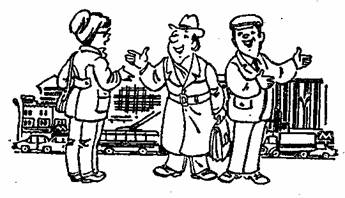
to get to the Houses of Parliament.
2. You are in a street (in a foreign city). You do not know how to get to. Ask a passer-by to tell you the way.
3. You are on a bus. Ask a passenger if this is the right bus.
4. You are in a taxi. You have an appointment at 9.30. Ask the taxi-driver to hurry.
5. At the airport you meet a friend of yours. On your way from the airport you discuss plans for sightseeing.
LESSON THREE
NEW GRAMMAR STRUCTURES
1. The Passive Voice (Страдательный залог)
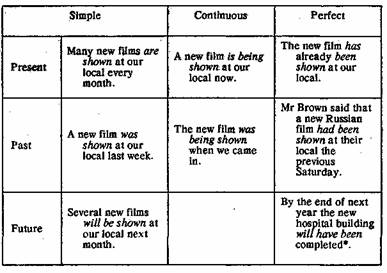
1. Passive Voice образуется с помощью вспомогательного глагола to be в соответствующем лице, числе и времени и Past Participle** (причастия прошедшего времени) смыслового глагола.
* Форма Future Perfect Passive будет введена в уроке 5.
** Об образовании Past Participle см. часть 1, урок 13.
ПРИМЕЧАНИЕ: В Passive Voice нет временной формы Future Continuous.
2. Passive Voice употребляется, когда в центре высказывания находится предмет, который подвергается какому-либо воздействию. Лицо, производящее воздействие, несущественно и поэтому часто совсем не упоминается. Например:
That school was built last year. Эта школа была построена в прошлом году.
ПРИМЕЧАНИЕ: В тех случаях, когда необходимо указать лицо, производящее действие, или орудие действия, или материал, из которого сделан предмет, употребляются предлоги by, with, of.
The play "Three Sisters" was written by Chekhov, the great Russian writer. Пьеса "Три сестры" была написана Чеховым, великим русским писателем.
Her letter was written with a pencil. Ее письмо было написано карандашом.
Many modern buildings are made of steel and glass. Многие современные здания строятся из стали и стекла.
3. В английском языке страдательный залог употребляется значительно шире, чем в русском. Это объясняется тем, что в английском языке в Passive Voice могут употребляться глаголы, принимающие любое дополпение (прямое, косвенное, предложное), тогда как в русском языке в страдательном залоге употребляются только глаголы, принимающие прямое дополнение.
ПРИМЕЧАНИЯ: 1. В тех случаях, когда в качестве подлежащего пассивной конструкции употребляется предложное дополнение, предлог сохраняет свое место после глагола и стоит под ударением.
Everyone listened to him with great attention.— He was 'listened 'to with 'great a~VMention. Его слушали с большим вниманием.
2. У глаголов (типа to give), принимающих в действительном залоге два беспредложных дополнения, оба дополнения могут быть подлежащими пассивной конструкции.
Не gave Ann an interesting book.— Ann was given an interesting book. An interesting book was given to Ann.
He told me the news this morning.— / was told the news this morning. The news was told to me this morning.
3. Глаголы to report (сообщать), to say, to believe [brli:v] (полагать), to expect tik'spelt] (ожидать, предполагать), to know и некоторые другие употребляются в Passive Voice в оборотах с предваряющим it: It is reported that... Сообщают (сообщается), что..., It is said that... Говорят, что..., It is believed that... Полагают, что..., It is expected that... Ожидают, что..., It is known that... Известно, что.... Эти обороты характерны для официальной речи и обычно встречаются в газетных статьях, официальных документах и т. д.
It is expected that many foreign guests will come to Moscow for the Great October Revolution celebration. Ожидают, что на празднование годовщины Великой Октябрьской социалистической революции в Москву приедет много иностранных гостей.
4. На русский язык английский страдательный залог может переводиться:
а) неопределенно-личными предложениями (чаще всего в тех случаях, когда не упоминается лицо, совершающее действие).
His new collection of poems has just been published. Только что опубликован его новый сборник стихов.
б) глаголами, оканчивающимися на -ся.
The letters are being typed now. Письма сейчас печатаются.
в) при помощи глагола быть и краткой формы причастия смыслового глагола.
When was this college opened? Когда был открыт этот колледж?
Exercise 1. Read and translate these sentences. Pay attention to the Passive Voice.
a) 1. Sochi Festivals of Song are attended by a lot of people. 2. I hear the game was lost by the Dynamo team yesterday. 3. "Were the letters signed yesterday?" "No, they were not." 4. "Will the translation be completed tomorrow?" "I hope, it will."
b) 5. I believe the hockey match is being shown on TV now. 6. The new sky-scraper is being made of glass and steel. 7. The factory was still being built when we came to live there.
c) 8. His last book has just been published. 9. The plan has been changed, hasn't it? 10. "Nothing has been done to help him," she said. 11. All the passengers have been put down at the post-office. 12. He hasn't been put through, has he? 13. Has the list of students who want to see the war memorials been typed yet?
d) 14. His new novel is much talked about, isn'it? 15. I wonder why he is always laughed at* 16. Those papers haven't been looked through yet.
* to iaugh [la:f] at smb. смеяться над кем-л.
e) 17. It is expected that they will do everything possible to help him. 18. Л is believed that the Minister will attend the official opening.
Exercise 2. Respond to these questions according to the models.
a) Do people speak English in many countries? Yes, English is spoken in many countries.
1. Do people buy a lot of newspapers every day? 2. Do they translate a lot of foreign books into Russian every year?3. Do most people often spend summer holidays in the south?4. Do the Caucasian mountains protect the Black Sea coast from the cold northern winds?
b) Did they ask a lot of questions after the lecture? Yes, a lot of questions were asked after the lecture.
1. Did they complete the plan yesterday? 2, Did they show the film yesterday? 3. Did they publish his article last week? 4. Did he make a list of books last Monday? 5. Did they make the sky-scraper of glass and steel?
c) Shall I help you translate the article?
No, thank you. It's been translated.
1. Shall I help you type the letters? 2. Shall I tell him about it? 3. Shall I book train tickets? 4. Shall I invite them to the party? 5. Shall I make a list of students who want to see the film?
d) When will they complete the plan? Tomorrow? Yes, it'll be completed tomorrow.
1. When will they settle the problem? Next Wednesday? 2. When will he complete the novel? Next month? 3. When will they publish his new textbook? Next October? 4. When will they stage the play? Next April? 5. When will they change the plan? Next week?
e) Have they settled the problem yet?
No, it's still being settled.
1. Have they built the school yet? 2. Has he written the article yet? 3. Has he translated the novel yet? 4. Has she made a list of new textbooks yet?
f) They met the Browns yesterday. Did you know?
Yes, I knew the Browns had been met.
1. We took them round the city yesterday. Did you know? 2. They completed the school building last veeek. Did you know? 3. They invited the Smiths to the farewell dinner party. Did you know? 4. John bought a guide-book to St. Petersburg. Did you know?
g) Will you sign the letters? (Mr Brown)
No, they'll be signed by Mr Brown.
1. Will you translate this article? (a friend of mine) 2. Did you meet the delegation yesterday? (my school colleagues) 3. Have you completed the plan? (Peter Gromov) 4. Has he made a list of students? (Mary)
Exercise 3. Respond to the statements according to the models.
a) They've looked through the papers. So the papers have been looked through.
1. They talk a lot about his last play. 2. They will wait for John. 3. They are laughing at him. 4. He has not looked through his article yet.
b) Their plan will be a great success, (to expect) It is expected that their plan will be a great success.
1. Her acting made a great impression on everyone, (to believe) 2. Chekhov is very popular with British readers, (to know) 3. They are going to change their plan, (to say) 4. They failed to realize their plan, (to report) 5. They will stay in Tallinn for a couple of weeks, (to expect)
Exercise 4. Use the verbs in brackets in the proper tense of the Passive Voice.
1. Six Olympic complexes (to build) in Moscow for the 22nd Olympic Games. 2. Thousands of foreign guests (to invite) to attend the Winter Music Festival in Moscow. 3. Young people from many foreign countries (to teach) at Moscow university. 4. Nothing (to hear) of him since he left New York. 5. How many goals (to score) by the teams before the end of the first period? 6. When America (to discover)? 7. Do you know if the last match (to win) by Spartak? 8. I hate it when people (to laugh at). 9. It (to expect) that his new play will be a great success. 10. It (to know) that Aitmatov's last novel made a great impression on everyone. 11. It (to believe) that they went the wrong way. 12. It (to report) that his new novel is popular with the readers.
Exercise 5. Translate into English.
1. Интересно, в каких странах изучается русский язык. 2. Выступление молодого писателя было выслушано с большим вниманием. 3. Какие олимпийские комплексы были построены в Санкт-Петербурге и Таллинне перед XXII Олимпийскими играми? 4. О последнем романе Ю. Бондарева очень много говорят. 5. Когда мы приехали в этот город, завод еще только строился. 6. К сожалению, ничего не было сделано, чтобы помочь ему закончить работу. 7. Сообщают, что пьеса пользуется большим успехом. 8. Предполагают, что его новая пьеса будет поставлена Малым театром. 9. Ожидают, что поезд придет вовремя. 10. Просмотрены ли эти документы? — Нет еще. 11. Работа была сделана хорошо, не так ли? 12. Сейчас исполняется (поют) моя любимая песня. Послушайте ее, пожалуйста. Надеюсь, она вампонравится.
Exercise 6. Make up ten sentences using the Passive Voice.
2. Passive Infinitive (Инфинитив страдательного залога)

Инфинитив страдательного залога образуется с помощью инфинитива вспомогательного глагола to be и Past Participle смыслового глагола.
Инфинитив страдательного залога часто употребляется после модальных глаголов и их эквивалентов.
Something must be done to help them complete the job. Нужно что-то сделать, чтобы помочь им закончить работу.
We are sure the problem can be easily settled. Мы уверены, что эта проблема может быть легко решена.
The article may be translated today. Возможно, статью переведут сегодня.
Exercise 7. Give the Passive Infinitive form of the following verbs.
to book, to build, to finish, to take, to sign, to publish, to borrow, to teach, to see
Exercise 8. Transform these sentences according to the model and translate them.
He must complete the novel next month.
The novel must be completed next month.
1. He can finish this translation tonight. 2. You may buy a guide-book St. Petersburg in Moscow. 3. They should settle the problem. 4. He may sign the letter after lunch. 5. You should open the window. 6. They may publish his new bbok next January. 7. You should teach foreign languages to children. 8. You can borrow books from the library.
Exercise 9. Translate into English.
1. Я надеюсь, что статья может быть закончена сегодня. 2. Эти учебники также могут быть использованы. 3. Я полагаю, что план должен быть изменен. 4. Следует закрыть окно. В комнате прохладно. 5. Детей нужно учить иностранным языкам в раннем возрасте. 6. Много замечательных картин русских художников можно увидеть в Третьяковской галерее. 7. Билеты на самолет нужно заказать заранее.
3. Use of the Article with Geographical* Names (Употребление артикля с географическими названиями)
* geographical [cfeWgrasfikl] географический
1. Определенный артикль употребляется:
а) перед названиями заливов, проливов, морей и океанов: the Gulf of Finland ['finlsnd] Финский залив, the English Channel ['ijasnl] Английский канал (принятое в Великобритании название пролива Ла-Манш), the North Sea Северное море, the Irish ['ainj ] Sea Ирландское море, theCaspian ['kasspian] Sea Каспийское море, the Atlantic Ocean [at'laentik oujn] Атлантический океан, the Arctic ['a:ktik] Ocean Северный Ледовитый океан, the Pacific [ps'sifik] Ocean Тихий океан, the Indian ['mdisn] Ocean Индийский океан;
б) перед названиями горных цепей: the Caucasus ['kxkssas] Кавказ, the Ural ['jusrl] Mountains Уральские горы, the Pennines ['peninz] Пеннинские горы, the Cheviots ['^eviats] (the Cheviot Hills) горы Чевиот-Хилс, the Cambrian ['kaembnsn ] Mountains Кембрийские горы.
ПРИМЕЧАНИЕ: Перед названиями отдельных горных вершин артикль не употребляется: Elbrus [el'bru:z] Эльбрус, Ben Nevis [ben 'nevis] Бен-Невисе, Mount Everest ['maunt 'evgrest] Эверест.
в) перед названиями некоторых государств и городов: the Netherlands ['neQalandz] Нидерланды, the Ukraine [ju'krem] Украина, the Crimea [krai'mis] Крым, the Hague [heig] Гаага.
2. Артикль не употребляется перед названиями озер: Loch Ness [bk 'nes] Лох-Несс (озеро Несс, loch шотл. озеро), Lake Baikal [leik bai'ka:!] озеро Байкал.
4. Nouns "advice", "information", "news", "knowledge", "money" and "progress"
1. Существительные advice [sd'vais] совет, советы, information информация, сообщения, сведения, knowledge ['nolid3] знание, знания и progress успех, успехи; money [тлш] деньги употребляются только в форме единственного числа.
They gave us some good advice. Они дали нам несколько хороших советов.
There was very little information on the subject. По этому вопросу было очень мало сведений.
His knowledge of German is poor..У него слабые знания по немецкому языку.
Не is making progress in his studies. Он делает успехи в своих занятиях.
ПРИМЕЧАНИЕ: Существительное news новость, новости, хотя и имеет форму множественного числа, всегда употребляется с глаголом в форме единственного числа.
What is the news'! Какие новости?
2. Для передачи значения единственного числа используется сочетание a piece [pi:s] of: a piece of advice (один) совет, a piece of information (одно) сообщение, сведение, а piece of news (одна) новость.
3. Существительные advice, information и др. не употребляются с неопределенным артиклем. Они могут употребляться с неопределенными местоимениями some, any и определенным артиклем, если имеется ограничительное определение.
The advice he gave me is very good. Совет(ы), который (-ые) он мне дал, очень хороший (-ие).
















